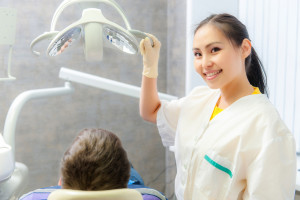
 Advances in dental technology have had a pronounced effect on how your dentist can manage your oral health. The use of lasers in dental treatments has meant that diagnostic procedures and dental treatments can be performed with greater precision, and with less discomfort. These techniques enable your dentist to address minute issues with greater accuracy. Decay that might not be detected in a visual inspection can be identified through laser diagnostics. Restorative treatments can use lasers instead of manual tools for a more comfortable, and accurate, experience.
Advances in dental technology have had a pronounced effect on how your dentist can manage your oral health. The use of lasers in dental treatments has meant that diagnostic procedures and dental treatments can be performed with greater precision, and with less discomfort. These techniques enable your dentist to address minute issues with greater accuracy. Decay that might not be detected in a visual inspection can be identified through laser diagnostics. Restorative treatments can use lasers instead of manual tools for a more comfortable, and accurate, experience.
Did you know that your dentist can actually check your teeth for cavities with lasers? Special diagnostic lasers can check the levels of fluorescence in your teeth; if a high amount of fluorescence is found, it can indicate decay. Lasers can also probe small crevices in your teeth, to check for cavities that might otherwise stay hidden. Lasers can also be used to perform a biopsy. If your dentist has found signs of oral cancer during a routine visit, a laser biopsy can be arranged to remove a small amount of suspect tissue for inspection.
Lasers can focus on a more precise area of your tooth than a manual tool, and can have less potential effect on your healthy tooth surrounding decay. This means that less of your tooth is affected during a procedure like a root canal treatment. Because lasers can find smaller cavities, it can even lead to earlier treatments, where your tooth can be restored with a small filling.